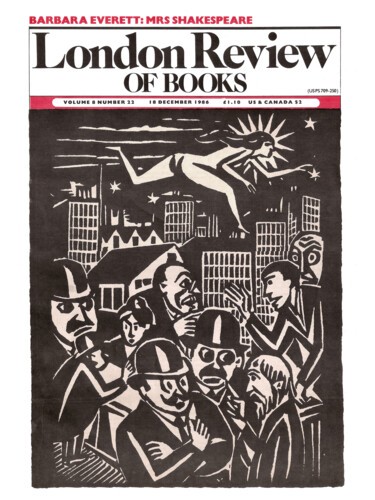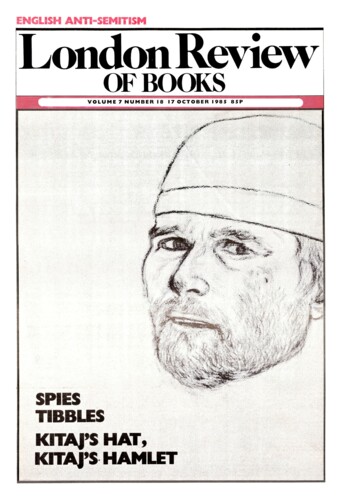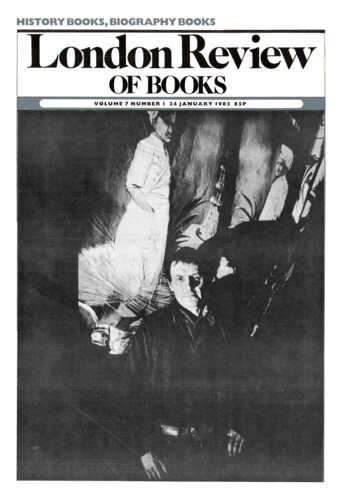Barbara Everett
Barbara Everett was for many years a fellow of Somerville College, Oxford. Her books include Poets in Their Time and Young Hamlet: Essays on Shakespeare’s Tragedies. She published editions of Antony and Cleopatra and All’s Well That Ends Well, as well as writing many influential essays on the plays. Among her subjects in the LRB have been Shakespeare’s romances, the Sonnets, Hamlet, The Winter’s Tale, Measure for Measure and Falstaff. Her selected pieces for the LRB were recently published as a book. She died on Friday, 4 April 2025 at the age of 92.
Mrs Shakespeare
Barbara Everett, 18 December 1986
Not many stories about Shakespeare that are either credible or interesting survived the poet: but one can be found in an additional note to Aubrey’s Brief Lives, which recalls him as ‘the more to be admired q[uia] he was not a company keeper, lived in Shoreditch, wouldn’t be debauched, and if invited to, writ: he was in pain.’ This sounds true in more than one way; perhaps Shakespeare did suffer from headaches as well as high principles and good manners. But what makes the anecdote memorable is that it so nicely sums up a writer’s struggle against another kind of takeover bid: that made by the ‘Society’ of readers and of criticism. He needs to be read, but read on his own terms. Shakespeare said in the Sonnets: ‘Noe, I am that I am.’
Tibbles
Barbara Everett, 17 October 1985
Even Swift, who liked to think he was half author of the Dunciad, had trouble with its allusions and wrote grumblingly to warn Pope that twenty miles from London ‘nobody understands hints, initial letters, or town facts and passages.’ The delighted poet seized his chance and added to his poem for its 1729 ‘Variorum’ edition those profuse helpful footnotes which make the text more confusing than before. Pope glosses, for instance, the first occurrence of the name of the poem’s first hero, called in it ‘Tibbald’ though we would now write the name of the Shakespearian scholar in question ‘Theobald’; and the poet’s note mentions that Tibbald’s name was in fact always pronounced so, though written as Theobald. Working on the poem rather more than two hundred years after Pope, the distinguished editor of the Twickenham Dunciad, James Sutherland, declined to take the poet at his word, and added a note on the annotation explaining that the name ‘really was pronounced’ Theobald. Presumably following this lead, an equally distinguished Popian, Maynard Mack, has now in his long-awaited and richly-informative new Life of Pope found a corner in which to extend this editorial scepticism into his own full-blown critical observation: ‘Even the name of the hero dunce, Lewis Theobald, though printed out in full, was “translated” (like Bottom wearing the ass’s head in A Midsummer Night’s Dream) into a foolish tumble of syllables rhyming with “ribald”.’ Elsewhere in the Life, Professor Mack makes the point that the sheer fictiveness of Timon’s villa in the ‘Epistle to Burlington’ ‘will be evident to those who have travelled much among English country houses’. It doesn’t seem irrelevant therefore to point out that those who travel much by bus in Holborn are likely to hear the conductors, not all of whom can have read the Dunciad, calling ‘Theobald’s Road’, ‘Tibbles Road’.
Eliot at Smokefall
24 January 1985
Eliot at smokefall
Barbara Everett, 24 January 1985
Two events of the last year have attracted a lot of notice. One is the production of Michael Hastings’s play, Tom and Viv, and the other the publication of Peter Ackroyd’s biography, T.S. Eliot. They of course share a subject, the poet himself. But this choice of subject, the life of the writer with perhaps the biggest public image of any in our time, suggests something else they have in common. These two works are in one way more alike than might be expected from the ‘creative’ or ‘fictional’ mode of the one, and the ‘critical’ or ‘factual’ mode of the other; and what brings them together, apart from some confusion of these categories, is their similar capacity to throw light on what is wrong with the present public image of the literary.
Pieces about Barbara Everett in the LRB
Talking about Shakespeare
Frank Kermode, 28 September 1989
Barbara Everett’s book consists of her four Northcliffe Lectures, given at University College London in 1988, on Hamlet and the other ‘major’ tragedies, together with a number...
Everett’s English Poets
Frank Kermode, 22 January 1987
Faced with the average book of modern literary criticism, the reviewer may wisely resolve to say nothing about the author’s skills as a writer of prose. If they ever existed, they would...
Read anywhere with the London Review of Books app, available now from the App Store for Apple devices, Google Play for Android devices and Amazon for your Kindle Fire.
Sign up to our newsletter
For highlights from the latest issue, our archive and the blog, as well as news, events and exclusive promotions.



